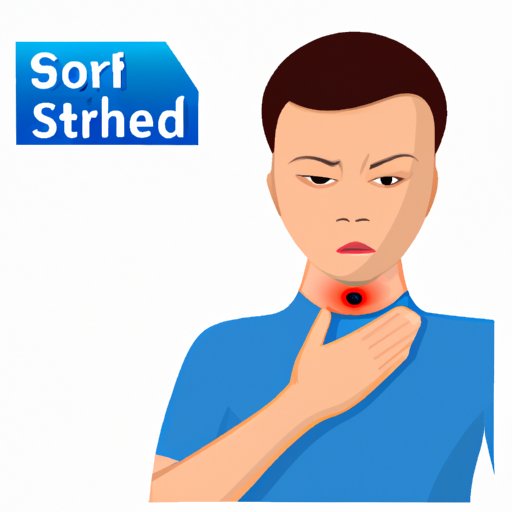
I. Introduction
Strep throat is a common bacterial infection that can cause a sore, scratchy throat, fever, and other symptoms. It’s important to recognize the signs of strep throat, as prompt treatment can prevent complications and stop the infection from spreading to others. This article will explore how to know if you have strep, including symptoms, self-diagnosis, testing, treatment, prevention, and more.
II. Symptoms of Strep: How to Recognize Them and Seek Treatment
Symptoms of strep throat can vary from person to person, but some of the most common signs and symptoms include:
- A sore, scratchy throat
- Pain or difficulty when swallowing
- Fever
- Headache
- Swollen lymph nodes in the neck
If you notice any of these symptoms, it’s important to seek medical attention right away. A healthcare professional can perform a quick test to determine whether the cause of your symptoms is strep.
III. Is it Strep or Just a Sore Throat? A Guide to Self-Diagnosis
It can be difficult to differentiate between a sore throat and strep throat, as they share many similar symptoms. However, strep throat is generally accompanied by more severe symptoms, including a high fever, headache, and swollen lymph nodes in the neck.
If you suspect that you may have strep throat, there are a few things you can do to help determine whether a trip to the doctor is necessary. First, examine your throat in a well-lit area using a mirror. Look for redness, white patches, or pus. Second, take your temperature. If it’s higher than 101 degrees, you may have strep throat. Finally, evaluate your symptoms. If they persist for more than a few days, or if you experience severe symptoms such as difficulty breathing, seek medical attention immediately.
IV. The Importance of Testing for Strep: What You Need to Know
If you suspect that you have strep throat, it’s important to get tested by a healthcare professional. A quick strep test involves swabbing the back of your throat to check for bacteria. If the test is positive, you’ll likely be prescribed antibiotics to help clear the infection. If the test is negative, it’s possible that you have another type of infection or illness, and further testing may be necessary.
It’s important to note that even if your test is negative, you should still follow up with your healthcare provider if your symptoms persist or worsen. Strep throat can be accompanied by other infections, such as a viral infection.
V. Treating Strep: How to Get Relief and Prevent Its Spread
The most effective way to treat strep throat is with antibiotics, which can help alleviate symptoms and prevent complications such as rheumatic fever. However, it’s important to complete the entire course of antibiotics, even if you start feeling better before they’re gone. This can help prevent the infection from recurring or spreading to others.
In addition to antibiotics, you can help alleviate your symptoms by taking over-the-counter pain relievers such as acetaminophen or ibuprofen. Be sure to follow the instructions on the label carefully, and never give aspirin to children.
During your treatment, it’s important to take steps to prevent spreading the infection to others. This includes washing your hands frequently, covering your mouth when coughing or sneezing, and avoiding close contact with others until you’ve been on antibiotics for at least 24 hours and are no longer contagious.
VI. Strep Prevention: Tips to Keep Your Symptoms at Bay
The best way to prevent strep throat is to practice good hygiene, such as washing your hands frequently and avoiding close contact with others who are sick. Additionally, taking steps to strengthen your immune system can help prevent infections such as strep. This includes getting plenty of rest, exercising regularly, and eating a healthy diet rich in vitamins and nutrients.
VII. Conclusion
If you suspect that you may have strep throat, it’s important to seek medical attention right away. A healthcare professional can perform a quick strep test to determine whether antibiotics are necessary. It’s also important to take steps to prevent spreading the infection to others, and to complete the full course of antibiotics as prescribed. By taking these steps, you can help ensure a speedy recovery and prevent complications.





